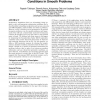Free Online Productivity Tools
i2Speak
i2Symbol
i2OCR
iTex2Img
iWeb2Print
iWeb2Shot
i2Type
iPdf2Split
iPdf2Merge
i2Bopomofo
i2Arabic
i2Style
i2Image
i2PDF
iLatex2Rtf
Sci2ools
131
click to vote
GECCO
2010
Springer
2010
Springer
Investigating EA solutions for approximate KKT conditions in smooth problems
Evolutionary algorithms (EAs) are increasingly being applied to solve real-parameter optimization problems due to their flexibility in handling complexities such as non-convexity, non-differentiability, multi-modality and noise in problems. However, an EA's solution is never guaranteed to be optimal in generic problems, even for smooth problems, and importantly EAs still lack a theoretically motivated termination criterion for stopping an EA run only when a near-optimal point is found. We address both these issues in this paper by integrating the Karush-Kuhn-Tucker (KKT) optimality conditions that involve first-order derivatives of objective and constraint functions with an EA. For this purpose, we define a KKT-proximity measure by relaxing the complimentary slackness condition associated with the KKT conditions. Results on a number of standard constrained test problems indicate that in spite of not using any gradient information and any theoretical optimality conditions, an EA&#...
GECCO 2010 | Optimality Conditions | Optimization | Real-parameter Optimization Problems | Termination Criterion |
| Added | 09 Nov 2010 |
| Updated | 09 Nov 2010 |
| Type | Conference |
| Year | 2010 |
| Where | GECCO |
| Authors | Rupesh Tulshyan, Ramnik Arora, Kalyanmoy Deb, Joydeep Dutta |
Comments (0)

